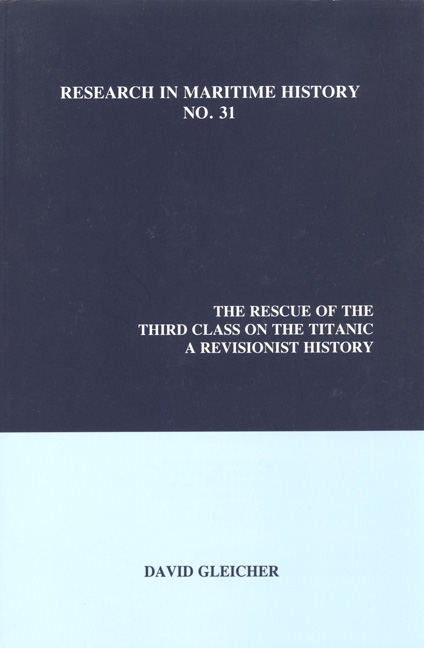Book contents
- Frontmatter
- Dedication
- Table of Contents
- List of Tables in the Text
- List of Illustrations
- Preface
- Notes on the Text
- Introduction
- Chapter 1 The “Popular Story”
- Chapter 2 The Nature Theatre of Oklahoma
- Chapter 3 Except the Rules
- Chapter 4 Departures
- Chapter 5 Like Wild Beasts Ready to Spring
- Chapter 6 Loose Ends
- Chapter 7 A Statistical Study
- Chapter 8 In Conclusion
- Appendix 1 Groupings of Nationalities into Regions
- Appendix 2 Routes to the Lifeboats
- Appendix 3 Deck Plans
- Bibliography
Chapter 7 - A Statistical Study
- Frontmatter
- Dedication
- Table of Contents
- List of Tables in the Text
- List of Illustrations
- Preface
- Notes on the Text
- Introduction
- Chapter 1 The “Popular Story”
- Chapter 2 The Nature Theatre of Oklahoma
- Chapter 3 Except the Rules
- Chapter 4 Departures
- Chapter 5 Like Wild Beasts Ready to Spring
- Chapter 6 Loose Ends
- Chapter 7 A Statistical Study
- Chapter 8 In Conclusion
- Appendix 1 Groupings of Nationalities into Regions
- Appendix 2 Routes to the Lifeboats
- Appendix 3 Deck Plans
- Bibliography
Summary
Logistic Regression Analysis
The body of this work - the skeleton comprising our five phases - has been a detailed account based on the best testimonial evidence available of the treatment of the Third Class passengers on Titanic. In this chapter we test our conclusions through a statistical study of the likelihood of a passenger surviving the sinking of the ship. Hermann Söldner has provided accurate information about the 1318 passengers aboard Titanic which lends itself to statistical investigations. Debbie Beavis has sorted out, without absolutely resolving the issue, questions such as which individuals with tickets were actually aboard on the evening of 14 April 1912.
We have conducted a logistic regression analysis of the likelihood of any particular Titanic passenger surviving the accident, based upon his or her individual characteristics, including class. A more technical discussion of logistic regression analysis is found in the final section of this chapter. In broad terms, regression analysis comprises a set of statistical methodologies and analytic techniques used extensively in, among others, the fields of economics, finance, political science and history. It enables us to sort out, with a quantifiable degree of certainty, various hypothetical causes of a particular observable effect.
Here, we are interested in who was able to survive the accident; the probability of surviving relative to that of not surviving is the “dependent” or the “criterion” variable. A number of “explanatory variables” are apparent in the data: in addition to gender and class (as indicated by the ticket purchased), these include age, responsibility for children and nationality. Each has been put forward at one time or another as a significant factor in whether a passenger lived or died. “Significant factor” or “statistical significance” means that, in the absence of a relationship, the probability of observing what has actually occurred in the data would be quite small; e.g., one, five or ten percent. In the analysis that follows we will reject the hypothesis that there was no significant difference or effect when the probability is less than five percent. Our critical degree of confidence is ninety-five percent.
A broad difficulty is that more than one explanatory variable is likely to have influenced the dependent variable simultaneously.
- Type
- Chapter
- Information
- The Rescue of the Third Class on the TitanicA Revisionist History, pp. 253 - 264Publisher: Liverpool University PressPrint publication year: 2006



